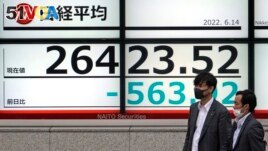14 June 2022
A major measure of the U.S. stock market, the S&P 500 Index, decreased 3.9 percent Monday. That means the index has fallen about 22 percent below its recent high in early January.
When an index falls 20 percent or more from a recent high for a continued period, investors call it a bear market.
Bears usually sleep, or hibernates, for the whole winter. So, bears represent a market that is withdrawing, said Sam Stovall. He is a top investment expert at CFRA, a market research business.

Men wearing masks walk past an electronic stock board showing Japan's Nikkei 225 index Tuesday, June 14, 2022, in Tokyo. Asian shares fell Tuesday after Wall Street tumbled into a bear market. (AP Photo/Shuji Kajiyama)
Investors call a rising stock market a bull market because bulls move forward, Stovall explained.
Other major market indexes in the U.S., including the Dow Jones Industrial Average and Nasdaq, all decreased. Bitcoin, a form of digital money, fell below $23,000 on Monday. That is down from nearly $68,000 for one bitcoin late last year.
On Tuesday, stock market indexes generally went down across Europe and Asia. Investors are worried over inflation, high interest rates, a slowdown in China's economy and the war in Ukraine.
What is worrying investors?
Investors are concerned that the U.S. Federal Reserve will have to raise interest rates a lot to control rising inflation. The U.S. central bank controls an important interest rate that affects banks and influences other rates.
Increasing interest rates slow the economy by making it more costly to borrow money. The risk is the Federal Reserve could cause a recession if it raises rates too high or too quickly.
Other central banks, including the Bank of England, have been raising rates as well. The European Central Bank said it will do so next month and in September.
Last month, the Federal Reserve signaled that more rate increases are coming as inflation is at its highest level in 40 years.
Russia's war in Ukraine has added pressure on prices by driving up the cost of oil and food. The slowdown of China's economy, the world's second largest, has added to concerns about financial issues.
Do we need to avoid a recession?
Even if the Federal Reserve could control inflation without a downturn in the economy, higher interest rates still put downward pressure on stock prices.
If people are paying more to borrow money, they buy fewer goods. It means businesses make smaller profits or lose money. Lower profits drive down a company's stock price.
Critics are saying stock prices were too high before the downturn. Big technology stocks and others that gained a lot during the pandemic have since lost value.
Ryan Detrick is chief market expert at LPL Financial, an investment advisory business. He said if there were a recession along with a bear market, stock prices could decrease an additional 10 percent.
How long does a bear market last?
On average, bear markets have taken 13 months to go from peak to trough, or from the highest to the lowest points. They also have taken about 27 months to get back to the break-even point since the 1940s.
The S&P 500 index has fallen an average of 33 percent during bear markets during that period. The biggest decline since 1945 happened in the 2007-2009 bear market when the S&P 500 fell 57 percent. And the longest bear market lasted 61 months and ended in March 1942. It cut the index by 60 percent.
How do investors know when a bear market has ended?
Generally, investors look for a 20 percent gain from a low point and continued gains over at least a six-month period.
But after the 2020 bear market, it took less than three weeks for stocks to rise 20 percent from their low in March of that year.
I'm Faith Pirlo. And I'm Mario Ritter, Jr.
Stan Choe and Alex Veiga reported this story for the Associated Press. Hai Do adapted it for VOA Learning English.
We want to hear from you. Does news of the stock markets affect you? Write to us in the Comments section, and visit 51VOA.COM.
___________________________________________________________________
Words in This Story
break-even –adj. when costs and income are equal; the point where a profit is possible, especially when talking about stocks